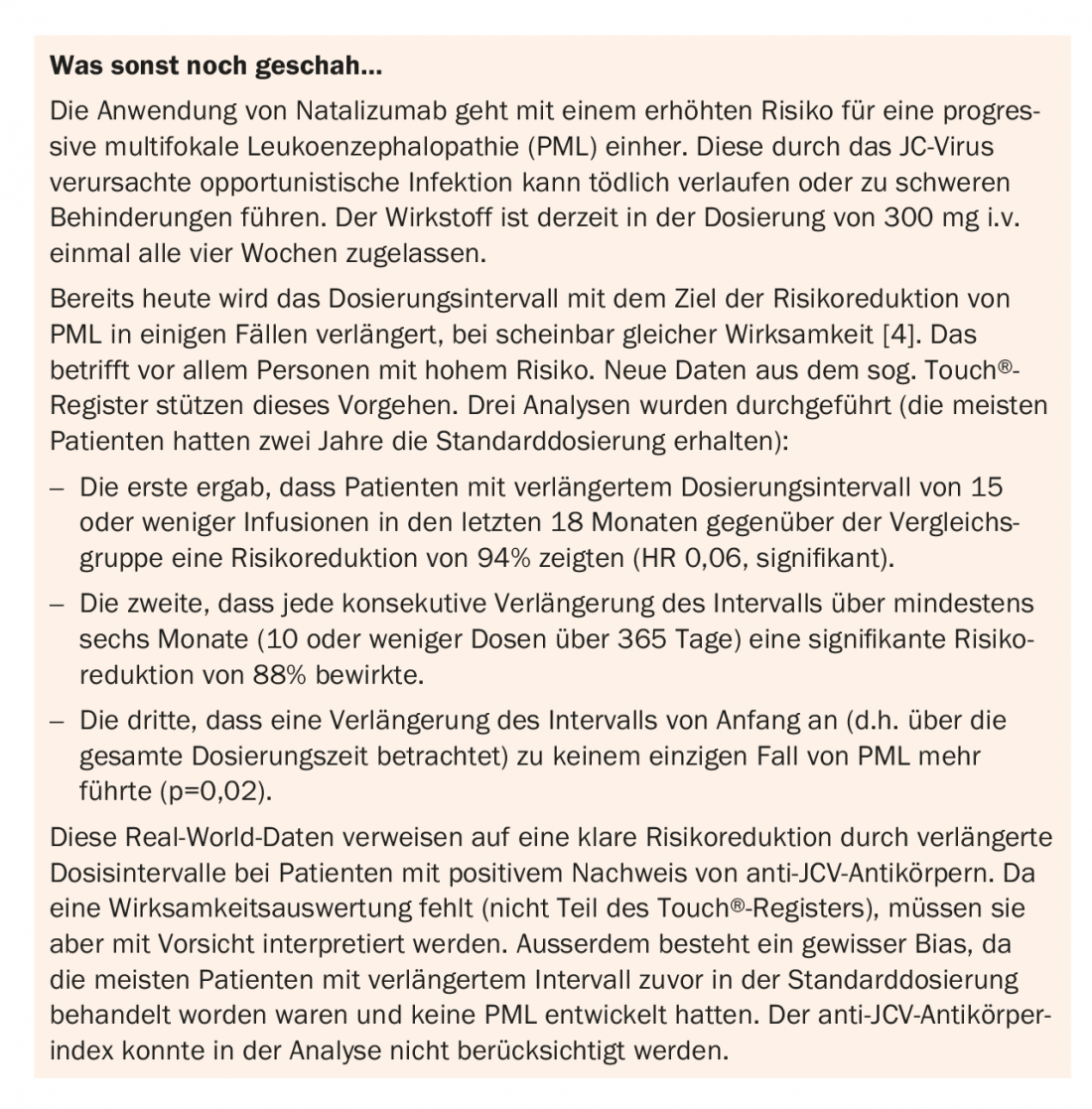Psychiatric comorbidities in MS are often not assessed in a standardized manner. This is the conclusion of a study at the ACTRIMS Forum. Similar findings apply to cognitive performance changes.
Neuropsychiatric symptoms can appear in multiple sclerosis both before neurological diagnosis and during disease progression and usually have a multifactorial etiology. Psychiatric comorbidities have an impact on the treatment and quality of life of MS patients that should not be underestimated, but are sometimes difficult to diagnose. If the diagnosis is missed in clinical practice, the treatment of these comorbidities is also inadequate. That is a pity, because therapeutically they are quite accessible. Ideally, a proper diagnosis in interdisciplinary cooperation with psychiatrists and, if necessary, neuropsychologists is indicated. Depressive disorders are particularly common as psychiatric concomitants of MS.
The same is true for cognitive deficits. Increased awareness is needed here as well. Although they are very frequent and highly relevant to everyday life (they determine the patient’s ability to work), they are still too seldom raised and taken into account from the outset – among other things, this is probably due to the insufficient therapeutic options. Overall, the data situation is poor.
Does the use of standardized tests make sense?
Early use of screening tools is recommended to avoid missing the two disease areas (which unfortunately is still often the case today). Cognitive deficits can be assessed, for example, with the BICAMS battery [1].
Now, as is well known, recommendations and everyday clinical practice sometimes differ greatly. For the individual patient, however, raising physicians’ awareness of the issue has enormous relevance, as the impact on his or her lifestyle is sometimes very tangible. For example, years of underdiagnosed or undiagnosed depression can, in the worst case, contribute to suicide, or deteriorating cognitive performance can ultimately lead to job loss, early retirement, and general work absenteeism [2] (not to mention the societal costs) – regardless of or in addition to the degree of disability [3].
New results on the subject
A study that tackled this question in detail was presented at ACTRIMS. The purpose was to elicit current use, perceptions, and barriers regarding cognitive and psychiatric screening instruments – in a (after all, it is the ACTRIMS, not the ECTRIMS) US physician pool. More specifically, these were two large specialty hospitals from the southeastern United States that contributed a total of 300 electronic medical records to the review. This was supplemented with a survey of eleven national MS luminaries working at various centers within the country. It was about
- The extent to which screening tools are used (review of electronic medical records).
- Perceptions of these tools/value of formal screening (expert survey of neurologists).
- Hurdles in the use of the tools (expert survey of neurologists).
The medical records contained surprisingly low rates of documented use of such standardization tools: Although cognitive deficits and depression were noted in 36% and 44% of patients at each of the two clinics (which is roughly in line with known figures from the literature). However, most of them are based on informal research and only very rarely, 2% and 3%, on validated tools. There were no weighty differences between the two clinics.
Referrals to neuropsychologists and psychiatrists for cognitive deficits and depression occurred in 26% and 64%, respectively.
What are the reasons for the infrequent use?
In stark contrast to the aforementioned data, 45% and 36% of the experts surveyed reported using validated tools in the diagnosis of the two disease areas (although the tools used varied widely). Is there possibly a discrepancy here in physician self-image and day-to-day clinical reality, or are the differences between U.S. hospitals really that great?
Very often, lack of time was given as a reason for not using a standardized tool. Unsurprisingly, but not always tenable: the execution time for the entire BICAMS screening battery is about 20 minutes (the “B” stands for “brief”). However, the SDMT, which takes only about 90 seconds to complete, would still be meaningful as a standardized test format. Of course, the evaluation time must also be included in the effort, yet the lack of time does not seem to be the only hurdle in the application of such tests.
Further reasons given were the partial lack of evidence for the use of such tools and (in a similar argumentation as above) the lack of billing possibilities or too little compensation at the insurers. Both are perfectly legitimate objections. However, there are significant differences in the amount of time and therefore billing among the various tests. The same applies to evidence, although of course only validated tests should be used. In any case, it is clear that the American insurance system differs fundamentally from the Swiss system.

Finally, and in many cases this may be the simplest but also most accurate explanation, respondents indicated that they simply “personally prefer” a loosely structured patient interview as the basis for a cognitive and psychological inventory of the patient. And in fact, they weren’t even that wrong, given the rates of documented depression and cognition deficits. Most importantly, symptoms should not go undetected, further referrals to specialists should be made, and therapies should be adapted. How problematic the fact that the paths to this goal are so different remains to be discussed – in general, the use of such tools would be desirable just to bring a certain standardization into the process. This can also facilitate long-term follow-up in individual patients, as well as doctor-patient communication.
Finally, it should be mentioned that screening, no matter how carefully it is used, is of course no substitute for an elaborate neuropsychological assessment. It rather serves the early recognition of the symptoms, should accompany the therapy and be included in appropriate decisions. The experts agree on this.
Source: ACTRIMS 2018 Forum, February 1-3, 2018, San Diego.
Literature:
- Langdon DW, et al: Recommendations for a Brief International Cognitive Assessment for Multiple Sclerosis (BICAMS). Mult Scler 2012; 18(6): 891-898.
- Benedict RH, et al: Benchmarks of meaningful impairment on the MSFC and BICAMS. Mult Scler 2016; 22(14): 1874-1882.
- Kobelt G, et al: New insights into the burden and costs of multiple sclerosis in Europe. Mult Scler 2017; 23(8): 1123-1136.
- Zhovtis Ryerson L, et al: Extended interval dosing of natalizumab in multiple sclerosis. J Neurol Neurosurg Psychiatry 2016 Aug; 87(8): 885-889.
InFo NEUROLOGY & PSYCHIATRY 2018; 16(2). 47-48











